导学案Module 6 Unit1 Reading 修改 上课用
- 格式:doc
- 大小:211.50 KB
- 文档页数:30
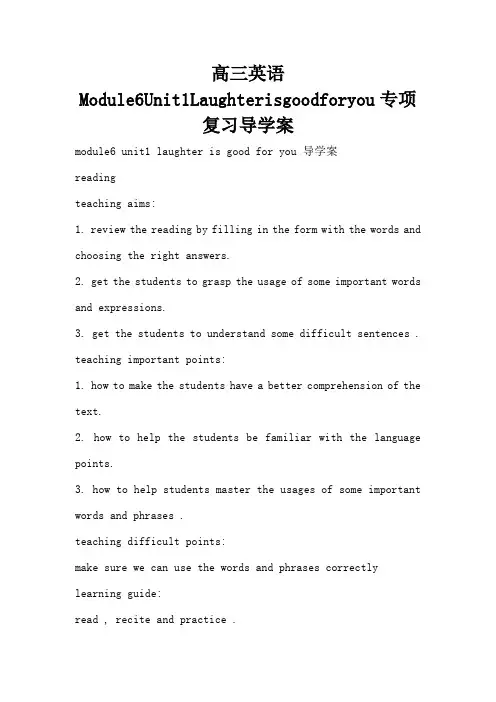
高三英语Module6Unit1Laughterisgoodforyou专项复习导学案module6 unit1 laughter is good for you 导学案readingteaching aims:1. review the reading by filling in the form with the words and choosing the right answers.2. get the students to grasp the usage of some important words and expressions.3. get the students to understand some difficult sentences . teaching important points:1. how to make the students have a better comprehension of the text.2. how to help the students be familiar with the language points.3. how to help students master the usages of some important words and phrases .teaching difficult points:make sure we can use the words and phrases correctly learning guide:read , recite and practice .language connection:review some words and phrases learnt last class.teaching procedures:step 1:revision and lead-inchoose the correct answer1. a stand-up comedian might decide to tell different jokes _____ reactions of an audience.a. as a result ofb. in response ofc. according tod. referred to2. in observational comedy, the comedian makes jokes about humorous things he or she _____ in everyday life.a. watchesb. seesc. observesd. looks3. each time, he performs his stand-up routine in front of millions of people ____ the show is broadcast live on tv.a. ifb. whenc. asd. during4. one little known fact is ____crystal is the host of the academy awards, he always keeps a toothbrush in his pocket for good luck.a. thatb. whenc. that whend. when that5. you can ____ to hear a lot more from billy crystal ---he has no plans to stop making films, or to stop telling jokes.a. promiseb. waitc. hoped. expect6. laughing helps your body stay healthy and can _______ help you fight pain.a. evenb. everc. justd. still7. whatever the reason, research shows that in the end, the english saying ‘ laughter is the best medicine’ may be true _____.a. after allb. at allc. above alld. all overstep2 : try to remember the phrases as quickly as possible. 注意下列短语1.被绊倒 ________________2.减肥 _____________________我的掌握情况好()一般()不好()step4: learn some language points.(方法引导:熟读课文并借助字典去查阅相关知识点的用法)(a级)ughter[c]n. 笑声;v. laugh 笑,大笑laugh at 发笑,嘲笑【考点快讯】①while the children were listening to their teacher’s joke, they were shouting .a. in laughterb. with laughterc. in tearsd. with laughter②no one enjoys .step1:1.b 2.c 3.b 4.c 5.d 6.a 7.aunit1 module6 grammar 导学案the present tenses(现在时态)learning points(学习目标):1.to grasp the usages of the present tenses.2.to finish some exercises about the present tenses. important points(学习重点):1.to understand the difference between the present tense2.know more about special rules of the present perfect tense difficult points:(学习难点)how to use the four present tenses well.learning guide(方法引导):read,remember and applystep1. review all types of the form of the four present tenses step2.overview of the tenses:一、the simple present (一般现在时)1.一般现在时表示经常发生、习惯性动作、客观真理、科学事实、格言,目前的特征、状态、能力等。
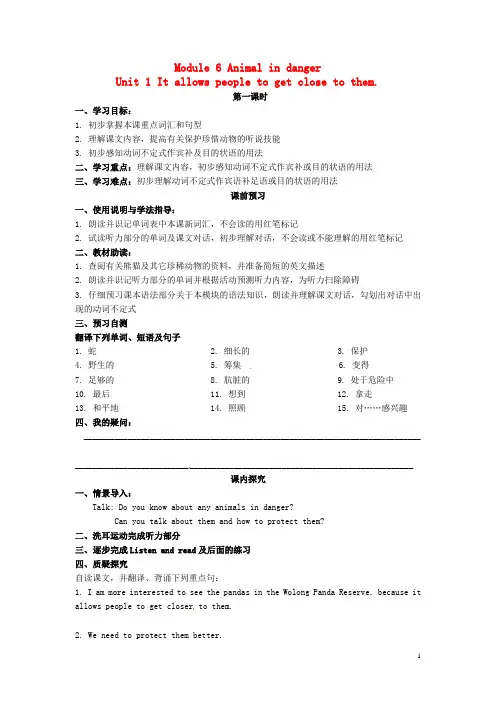
Module 6 Animal in dangerUnit 1 It allows people to get close to them.第一课时一、学习目标:1. 初步掌握本课重点词汇和句型2. 理解课文内容,提高有关保护珍惜动物的听说技能3. 初步感知动词不定式作宾补及目的状语的用法二、学习重点:理解课文内容,初步感知动词不定式作宾补或目的状语的用法三、学习难点:初步理解动词不定式作宾语补足语或目的状语的用法课前预习一、使用说明与学法指导:1. 朗读并识记单词表中本课新词汇,不会读的用红笔标记2. 试读听力部分的单词及课文对话,初步理解对话,不会读或不能理解的用红笔标记二、教材助读:1. 查阅有关熊猫及其它珍稀动物的资料,并准备简短的英文描述2. 朗读并识记听力部分的单词并根据活动预测听力内容,为听力扫除障碍3. 仔细预习课本语法部分关于本模块的语法知识,朗读并理解课文对话,勾划出对话中出现的动词不定式三、预习自测翻译下列单词、短语及句子1. 蛇2. 细长的3. 保护4. 野生的5. 筹集6. 变得7. 足够的 8. 肮脏的 9. 处于危险中10. 最后 11. 想到 12. 拿走13. 和平地 14. 照顾 15. 对……感兴趣四、我的疑问:__________________________________________________________________________________________________________________________________________________________课内探究一、情景导入:Talk: Do you know about any animals in danger?Can you talk about them and how to protect them?二、洗耳运动完成听力部分三、逐步完成Listen and read及后面的练习四、质疑探究自读课文,并翻译、背诵下列重点句:1. I am more interested to see the pandas in the Wolong Panda Reserve, because it allows people to get closer to them.2. We need to protect them better.3. Many wild animals don’t have a safe place to live.4. Also, often there isn’t enough clean water, because we’ve made it dirty.5. That means we can give money to help protect the animals.五、当堂检测Work in groups. Make dialogues talking about animals in danger.六、课后反思_____________________________________________________________________________ _____________________________________________________________________________课后训练一、根据首字母或中文意思写单词1.We should protect the wild animals in ________________ (危险).2.We should take an active part in ___________________ (保护) environment.3._________________ (蛇) are long and thin.4.He oft en __________________ (允许) me to eat fast food once a week .5.We must do something useful to protect the animals i n the __________________ (野生环境)二、用所给词的适当形式填空1.He is much _________________ (thin) than I am.2.The panda is in __________________ (dangerous) of dying. Let’s help it.3.More and more people are __________________ (interest) in computer.4.My parents allow me ___________________ (watch) TV every day.5.Do you like this __________________ (week) talk show.课后学习指导:朗读对话并背诵,注意语音语调Unit 1 It allows people to get close to them. 第二课时一、学习目标:1. 熟练掌握本课重点词汇句型,并初步理解动词不定式作宾语补足语或目的状语的用法2. 能听懂和理解有关戏剧或话剧的话题,培养听说技能3. 能用动词不定式进行简单的对话二、学习重点:初步理解动词不定式作宾语补足语或目的状语的用法三、学习难点:理解并熟悉宾语补足语和目的状语的用法课前预习一、使用说明与学法指导:1. 通过语音训练拓展日常交际用语2. 通过对话表演方式大胆开口,能用英语进行有关保护珍稀动物的交流3、观察对话总结接动词不定式作宾语补足语或目的状语的单词或结构二、教材助读:朗读并理解语音部分的词句,注意结对反复练习句子中的停顿三、预习自测(一) 小组合作练习Activity 5句子中的停顿,相互纠正(二) 完成Activity 6, 7并结对练习,注意结合Activity5的语音知识反复练习四、我的疑问:__________________________________________________________________________________________________________________________________________________________课内探究一、情景导入Work in pairs. Retell the main idea of the conve rsation.二、按要求完成语音部分注意英语口语中的停顿现象三、质疑探究知识要点探究1. I am more interested to see the pandas in the Wolong Panda Reserve, because it allows people to get closer to them. 我对于去看卧龙保护区的熊猫更感兴趣,因为它允许人们更靠近。
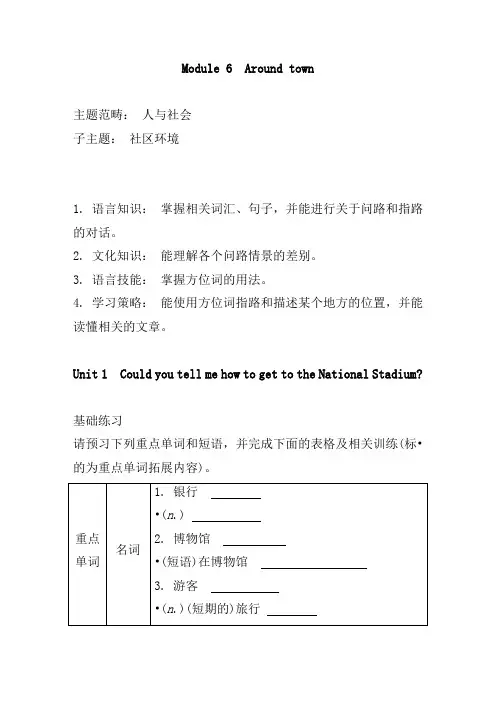
Module 6Around town主题范畴:人与社会子主题:社区环境1. 语言知识:掌握相关词汇、句子,并能进行关于问路和指路的对话。
2. 文化知识:能理解各个问路情景的差别。
3. 语言技能:掌握方位词的用法。
4. 学习策略:能使用方位词指路和描述某个地方的位置,并能读懂相关的文章。
Unit 1Could you tell me how to get to the National Stadium?基础练习请预习下列重点单词和短语,并完成下面的表格及相关训练(标•的为重点单词拓展内容)。
学以致用根据语境或提示,完成填空。
1. I will go to the Natural History Museum (博物馆) with my sister this weekend.2. Don't play on the street (街道). It's too dangerous.3. The b ookshop is over there. You can go and buy some books for your son.4. —Where are you?—I'm in the b ank to get some money.5. I got up early this morning and I'm the third (three) student to get to school.6. There are thousands of tourists (游客) here every year.7. Look around before you go a the road.8. Tom (take) a plane to Beijing last year.9. C you tell me how to get to the Beihai Supermarket?10. I'm new here, and may I have a look at the(旅行指南)?佳句仿写用句中黑体词或短语仿写句子。
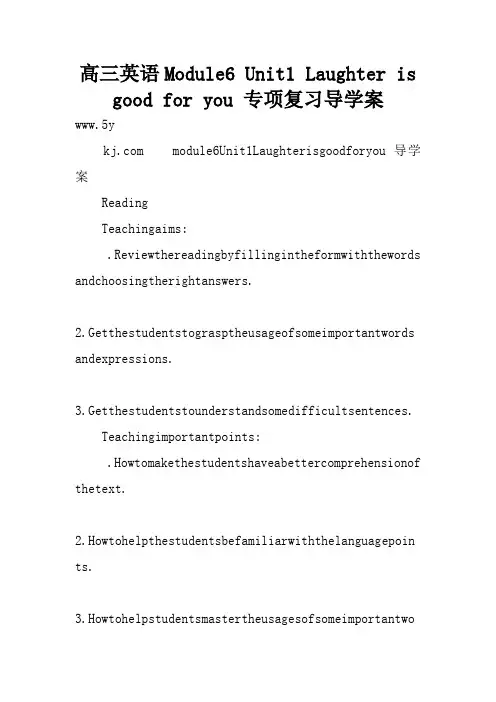
高三英语Module6 Unit1 Laughter is good for you 专项复习导学案www.5y module6Unit1Laughterisgoodforyou导学案ReadingTeachingaims:.Reviewthereadingbyfillingintheformwiththewords andchoosingtherightanswers.2.Getthestudentstograsptheusageofsomeimportantwords andexpressions.3.Getthestudentstounderstandsomedifficultsentences.Teachingimportantpoints:.Howtomakethestudentshaveabettercomprehensionof thetext.2.Howtohelpthestudentsbefamiliarwiththelanguagepoin ts.3.Howtohelpstudentsmastertheusagesofsomeimportantwordsandphrases.Teachingdifficultpoints:makesurewecanusethewordsandphrasescorrectlyLearningguide:Read,reciteandpractice.Languageconnection:Reviewsomewordsandphraseslearntlastclass.Teachingprocedures:Step1:Revisionandlead-inchoosethecorrectanswer.Astand-upcomedianmightdecidetotelldifferentjok es_____reactionsofanaudience.A.asaresultofB.inresponseofc.accordingtoD.referredto2.Inobservationalcomedy,thecomedianmakesjokesabouth umorousthingsheorshe_____ineverydaylife.A.watchesB.seesc.observesD.looks3.Eachtime,heperformshisstand-uproutineinfrontofmil lionsofpeople____theshowisbroadcastliveonTV.A.ifB.whenc.asD.during4.onelittleknownfactis____crystalisthehostoftheAcad emyAwards,healwayskeepsatoothbrushinhispocketforgoo dluck.A.thatB.whenc.thatwhenD.whenthat5.youcan____tohearalotmorefromBillycrystal---hehasn oplanstostopmakingfilms,ortostoptellingjokes.A.promiseB.waitc.hopeD.expectughinghelpsyourbodystayhealthyandcan_______help youfightpain.A.evenB.everc.justD.still7.whateverthereason,researchshowsthatintheend,theEn glishsaying‘Laughteristhebestmedicine’maybetrue_____.A.afterallB.atallc.aboveallD.alloverStep2:Trytorememberthephrasesasquicklyaspossible.注意下列短语.被绊倒________________2.减肥_____________________3.对某人做印象模仿________________4.效仿他人_______________5.对……有影响________________6.后来_______________________7.拿……开玩笑____________________8.在舞台上_______________________9.对……作出反应__________________0.排队____________________Step3.Fillintheblankswiththefollowingphrases.change theformifnecessary.onstagequeueupmakeupjokeaboutpointtomakefunofinresponsetolateron.Thisoutstandinggirlwassenttome___________myrequestforasuitablesecretary.2.Theactorwas_________formostoftheplay.3.IforhourstobuyticketsforthisSunday’sconcert.4.Itiswrongtothestudentswhodonotdowellinexams.5.myfriendsandIofteneachother’sclothesandhairstyle,butwedonotmeananyharm.6.whenIaskedthemanfordirections,hetheshopIwaslookingfor,whichwasstraightacrosstheroad.7.Iwillbeoutoftheoffice,soifyouneedtocontactme,pleasecallmeonmymobilep hone.8.Sheastoryaboutwhyshewaslate,butnoonebelievedher.我的掌握情况好()一般()不好()Step4:Learnsomelanguagepoints.(方法引导:熟读课文并借助字典去查阅相关知识点的用法).laughter[c]n.笑声;ugh笑,大笑laughat发笑,嘲笑【考点快讯】①whilethechildrenwerelisteningtotheirteacher’sjoke,theywereshouting.A.inlaughterB.withlaughterc.intearsD.withlaughter②Nooneenjoys.ughingatB.beinglaughteratc.beinglaughingatD.beinglaughed2.makefunof取笑,拿……开玩笑[常用搭配]:makefunof开玩笑,嘲笑playjokeson开……的玩笑playatrickon捉弄,开玩笑【考点快讯】Daddydidn’tmindwhatweweredoing,aslongasweweretogether, fun.A.hadB.havec.tohaveD.having3.responseShemadenoresponse.Hercriesforhelpmetwithnoresponse.[单词积累]responsibility责任,负责,任务responsible须负责任的[知识链接]inresponseto对……做出反应beresponsibleto向……负责takeresponsiblefor对……负责beresponsiblefor对……负责,作为……的原因,应归功于……【考点快讯】.Theemployermustberesponsibletheemployeeswhiletheemployeesmustberesponsible theproject.A.for;toB.to;forc.to;toD.for;for2.Astand-upcomediancantelldifferentjokesthereactionofanaudience.A.inanswertoB.inresponsetoc.inreplytoD.A、B、andc3.live可作形容词或副词,意思是“现场的/地,直播的/地”eg:TherearelivefootballmatchesonTVeverySunday.每个星期天电视里都有现场直播的足球比赛。
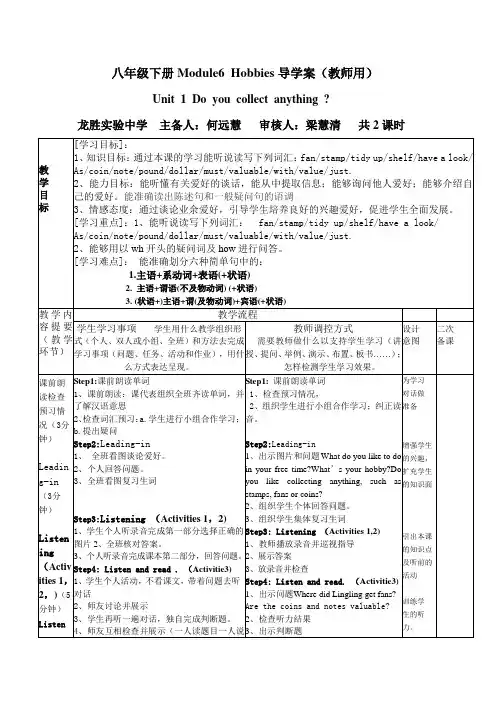
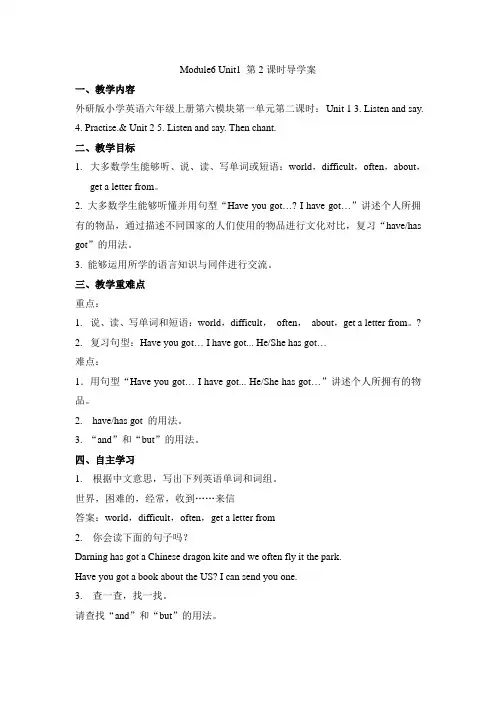
Module6 Unit1 第2课时导学案一、教学内容外研版小学英语六年级上册第六模块第一单元第二课时:Unit 1 3. Listen and say.4. Practise.& Unit 25. Listen and say. Then chant.二、教学目标1.大多数学生能够听、说、读、写单词或短语:world,difficult,often,about,get a letter from。
2. 大多数学生能够听懂并用句型“Have you got…? I have got…”讲述个人所拥有的物品,通过描述不同国家的人们使用的物品进行文化对比,复习“have/has got”的用法。
3. 能够运用所学的语言知识与同伴进行交流。
三、教学重难点重点:1.说、读、写单词和短语:world,difficult,often,about,get a letter from。
?2.复习句型:Have you got… I have got... He/She has got…难点:1.用句型“Have you got… I have got... He/She has got…”讲述个人所拥有的物品。
2. have/has got 的用法。
3. “and”和“but”的用法。
四、自主学习1. 根据中文意思,写出下列英语单词和词组。
世界,困难的,经常,收到……来信答案:world,difficult,often,get a letter from2. 你会读下面的句子吗?Darning has got a Chinese dragon kite and we often fly it the park.Have you got a book about the US? I can send you one.3. 查一查,找一找。
请查找“and”和“but”的用法。
五、课堂检测1. 读单词,将单词补充完整。
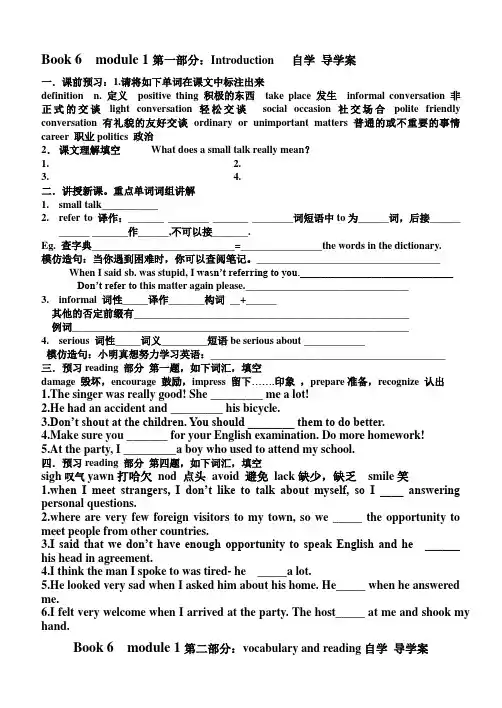
Book 6 module 1第一部分:Introduction 自学导学案一.课前预习:1.请将如下单词在课文中标注出来definition n. 定义positive thing 积极的东西take place 发生informal conversation 非正式的交谈light conversation 轻松交谈social occasion 社交场合polite friendly conversation 有礼貌的友好交谈ordinary or unimportant matters 普通的或不重要的事情career 职业politics 政治2.课文理解填空What does a small talk really mean?1. 2.3. 4.二.讲授新课。
重点单词词组讲解1.small talk___________2.refer to 译作:_______ ________ _______ ________词短语中to为______词,后接____________ _______作______,不可以接_______.Eg. 查字典____________________________=________________the words in the dictionary.模仿造句:当你遇到困难时,你可以查阅笔记。
____________________________________ When I said sb. was stupid, I wasn’t referring to you.______________________________Don’t refer to this matter again please.________________________________rmal 词性_____译作_______构词__+______其他的否定前缀有______________________________________________________例词__________________________________________________________________4.serious 词性_____词义_________短语be serious about ____________模仿造句:小明真想努力学习英语:______________________________________________ 三.预习reading 部分第一题,如下词汇,填空damage 毁坏,encourage 鼓励,impress 留下…….印象,prepare准备,recognize 认出1.The singer was really good! She _________ me a lot!2.He had an accident and _________ his bicycle.3.Don’t shout at the children. You should ________ them to do better.4.Make sure you _______ for your English examination. Do more homework!5.At the party, I _________a boy who used to attend my school.四.预习reading 部分第四题,如下词汇,填空sigh叹气yawn打哈欠nod 点头avoid 避免lack缺少,缺乏smile笑1.when I meet strangers, I don’t like to talk about myself, so I ____ answering personal questions.2.where are very few foreign visitors to my town, so we _____ the opportunity to meet people from other countries.3.I said that we don’t have enough opportunity to speak English and he ______ his head in agreement.4.I think the man I spoke to was tired- he _____a lot.5.He looked very sad when I asked him about his home. He_____ when he answered me.6.I felt very welcome when I arrived at the party. The host_____ at me and shook my hand.Book 6 module 1第二部分:vocabulary and reading自学导学案一.课前预习:1.请将如下单词在课文中标注出来Cross 穿过 avoid 避免 recognize 认出 confidently 自信地 guest 客人 lack the confidence 缺少自信 advance planning 预先准备 prepare 准备 low-risk conversation opener 是低风险的开场白 damage 毁坏 develop 提高 a two-way process 双向的过程 involve 涉及 impress 留下…….印象 encouraging noise and gestures 鼓励的声音或姿势 contact 接触 yawn 打哈欠 sigh 叹气 in addition 除此之外 host 主人 a certain color 一种特定颜色二.课文理解填空1. Read the passage and decide what kind of book it is from. Choose from. Choose from this list. (阅读课文,确定本文是出自什么样的书籍,从如下选项中选出)_______________1. an English teaching book2. A business course3. A book which tells you what to do at social events4. A book to help you prepare for a speaking examination2.3.读课文第二部分,回答那些话题是低风险的开场白(1) (2)(3)(4)4.5. 读最后一部分(找出不同文化下的一些社交规则)(1) (2)(3) (4)6.阅读课文回答课后第三题 1.According to the article, should people plan what they ’re going to say atparties?2.What do people think about those who talk too much?3.Describe two things you shouldn ’t do in a conversation.4.Why is it a good idea to nod and smile when the other person is talking?5.What does the quotation from Benjamin Disraele tell you about people?三.重点单词词组讲解1.damage 词性_____词义______ ______对……造成损害_______________________模仿造句:饮酒太多会损害你的健康_________________________________________ 地震对四川人们造成巨大损害______________________________________2. impress 短语:sb be impressed with _________________模仿造句:我对老师所说的话印象深刻_______________________________________sth be impressed on one’s mind ________________模仿造句:老师说的话深深地印在我的脑海里___________________________________3. make sure________________________ Make sure of / about ___________Make sure that _________模仿造句:你一定要确保明白我的话___________________模仿造句:我们必须确保孩子们的安全(safety)_______________________________4.confidently 词性____词义_____adj.________________n.__________________5. make friends with __________________________________________模仿造句:我发现与你交朋友很难____________________________________________ck 词性:_____词义:________模仿造句:他们没钱送她上大学:____________________________________For lack of :__________模仿造句:由于缺钱,我不能买那套房子:_______________Be lacking in:_________ 模仿造句:他缺少信心:____________________=_________________A lack of _________________模仿造句:缺钱、水____________________7.be nervous about ____________________________模仿造句:你知道他为什么紧张不安吗?___________________________________________7.advance:词性:____词义:___________advanced词性:____词义:___________模仿造句:如果你能来,请事先通知我们_________________________________她总是有先进的想法:_______________________________________8. think of ________________ think highly of ______________think nothing of _____________think of …as…_______________模仿造句:我正在考虑换工作_______________________________9.look away from ____________模仿造句:当老师讲课时,不要把目光移开她_________________________________10.in addition ________________=_______________作_______词In addition to _______________=______________相当于_______词Book 6 module 1 第三部分:Grammar复习情态动词+have done 结构1.didn’t have done 表示过去______做某事,事实上_______2.needn’t have done 表示过去_____做某事,但事实上___________.3.couldn’t\can’t have done 表示过去_____________,也可以理解为对过去事实的_____猜测。
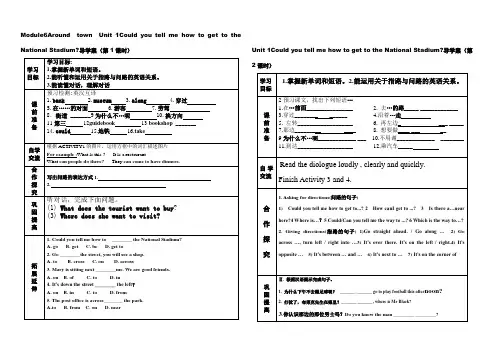
Module6Around town Unit 1Could you tell me how to get to the National Stadium?导学案(第1课时)学习目标学习目标:1.掌握新单词和短语。
2.能听懂和运用关于指路与问路的英语关系。
3.能读懂对话,理解对话课前准备预习检测:英汉互译1.bank2.museum3.along4.穿过5.在……的对面6.游客7.劳驾8.街道 _______9为什么不…呢 10.换方向11第三12guidebook13 bookshop _______ 14.could15.地铁16.take自学交流根据ACTIVITY1的图片,运用方框中的词汇描述图片For example :What is this ?It is a restaurant.What can people do there?They can come to have dinners.合作探究写出问路的表达方式1. 2.巩固提高听对话,完成下面问题。
(1) What does the tourist want to buy?(3) Where does she want to visit?拓展延伸1. Could you tell me how to ________ the National Stadium?A. goB. getC. beD. get to2. Go ________the street, you will see a shop.A. toB. crossC. onD. across3. Mary is sitting next ________me. We are good friends.A. onB. ofC. toD. in4. It’s down the street ________ the left?A. onB. inC. toD. from5. The post office is across _______ the park.A.toB. fromC. onD. nearUnit 1Could you tell me how to get to the National Stadium?导学案(第2课时)学习目标1.掌握新单词和短语。
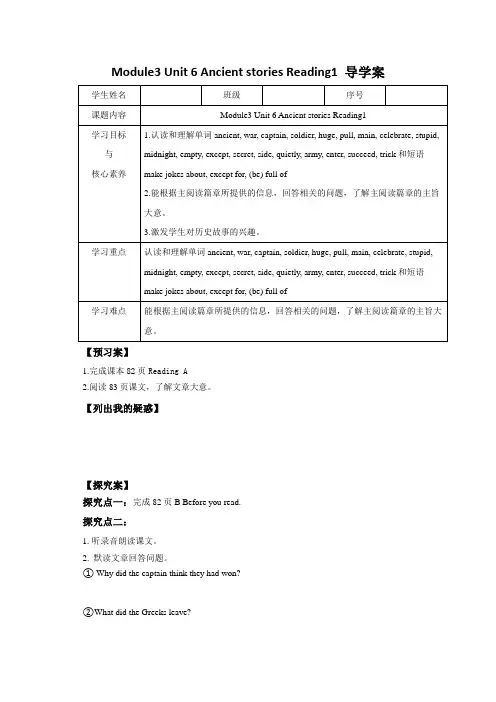
Module3 Unit 6 Ancient stories Reading1 导学案【预习案】1.完成课本82页Reading A2.阅读83页课文,了解文章大意。
【列出我的疑惑】【探究案】探究点一:完成82页B Before you read.探究点二:1.听录音朗读课文。
2. 默读文章回答问题。
① Why did the captain think they had won?_________________________________________________________________________ ②What did the Greeks leave?_________________________________________________________________________③What did the Trojans do with the wooden horse?_________________________________________________________________________ ④What did they do after the celebration?_________________________________________________________________________ ⑤What did the six soldiers do after they climbed out?_________________________________________________________________________ ⑥How did the Greeks succeed in capturing the city of Troy?_________________________________________________________________________ 3.找出代词指的是什么人。
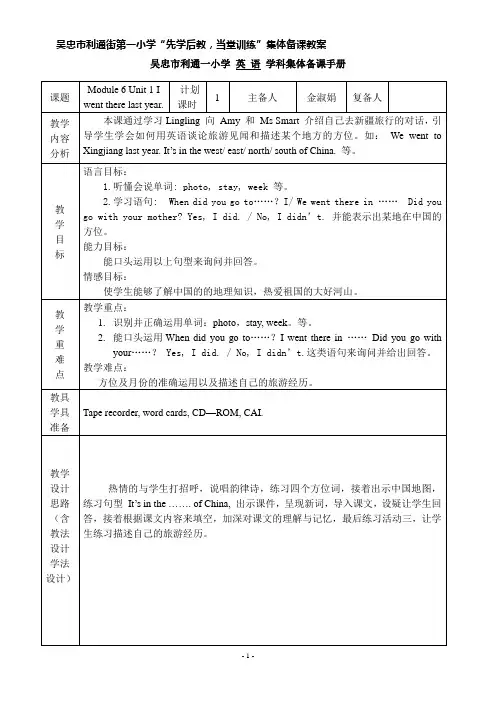
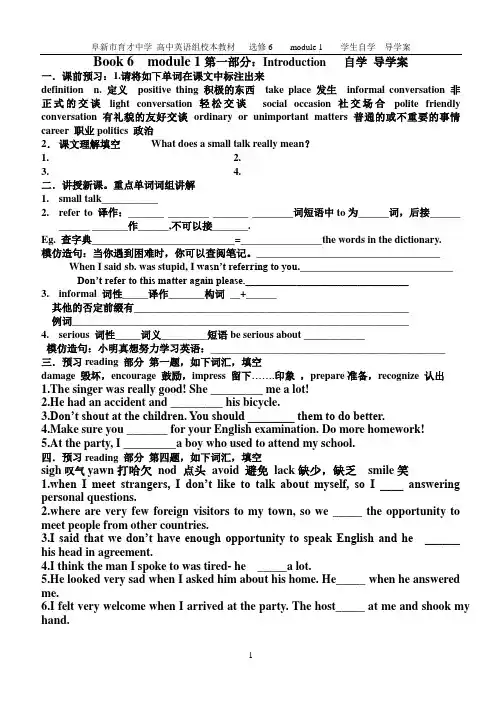
第一部分:Introduction 自学导学案一.课前预习:1.请将如下单词在课文中标注出来definition n. 定义positive thing 积极的东西take place 发生informal conversation 非正式的交谈light conversation 轻松交谈social occasion 社交场合polite friendly conversation 有礼貌的友好交谈ordinary or unimportant matters 普通的或不重要的事情career 职业politics 政治2.课文理解填空What does a small talk really mean?1. 2.3. 4.二.讲授新课。
重点单词词组讲解1.small talk___________2.refer to 译作:_______ ________ _______ ________词短语中to为______词,后接____________ _______作______,不可以接_______.Eg. 查字典____________________________=________________the words in the dictionary.模仿造句:当你遇到困难时,你可以查阅笔记。
____________________________________ When I said sb. was stupid, I wasn’t referring to you.______________________________Don’t refer to this matter again please.________________________________rmal 词性_____译作_______构词__+______其他的否定前缀有______________________________________________________例词__________________________________________________________________4.serious 词性_____词义_________短语be serious about ____________模仿造句:小明真想努力学习英语:______________________________________________ 三.预习reading 部分第一题,如下词汇,填空damage 毁坏,encourage 鼓励,impress 留下…….印象,prepare准备,recognize 认出1.The singer was really good! She _________ me a lot!2.He had an accident and _________ his bicycle.3.Don’t shout at the children. You should ________ them to do better.4.Make sure you _______ for your English examination. Do more homework!5.At the party, I _________a boy who used to attend my school.四.预习reading 部分第四题,如下词汇,填空sigh叹气yawn打哈欠nod 点头avoid 避免lack缺少,缺乏smile笑1.when I meet strangers, I don’t like to talk about myself, so I ____ answering personal questions.2.where are very few foreign visitors to my town, so we _____ the opportunity to meet people from other countries.3.I said that we don’t have enough opportunity to speak English and he ______ his head in agreement.4.I think the man I spoke to was tired- he _____a lot.5.He looked very sad when I asked him about his home. He_____ when he answered me.6.I felt very welcome when I arrived at the party. The host_____ at me and shook my hand.Book 6 module 1第二部分:vocabulary and reading 自学 导学案一.课前预习:1.请将如下单词在课文中标注出来Cross 穿过 avoid 避免 recognize 认出 confidently 自信地 guest 客人 lack the confidence 缺少自信 advance planning 预先准备 prepare 准备 low-risk conversation opener 是低风险的开场白 damage 毁坏 develop 提高 a two-way process 双向的过程 involve 涉及 impress 留下…….印象 encouraging noise and gestures 鼓励的声音或姿势 contact 接触 yawn 打哈欠 sigh 叹气 in addition 除此之外 host 主人 a certain color 一种特定颜色二.课文理解填空1. Read the passage and decide what kind of book it is from. Choose from. Choose from this list. (阅读课文,确定本文是出自什么样的书籍,从如下选项中选出)_______________1. an English teaching book2. A business course3. A book which tells you what to do at social events4. A book to help you prepare for a speaking examination2.3.读课文第二部分,回答那些话题是低风险的开场白(1) (2)(3)(4)4.5. 读最后一部分(找出不同文化下的一些社交规则)(1) (2)(3) (4)6.阅读课文回答课后第三题1.According to the article, should people plan what they’re going to say atparties?2.What do people think about those who talk too much?3.Describe two things you shouldn’t do in a conversation.4.Why is it a good idea to nod and smile when the other person is talking?5.What does the quotation from Benjamin Disraele tell you about people?三.重点单词词组讲解1.damage 词性_____词义______ ______对……造成损害_______________________模仿造句:饮酒太多会损害你的健康_________________________________________ 地震对四川人们造成巨大损害______________________________________2. impress 短语:sb be impressed with _________________模仿造句:我对老师所说的话印象深刻_______________________________________sth be impressed on one’s mind ________________模仿造句:老师说的话深深地印在我的脑海里___________________________________3. make sure________________________ Make sure of / about ___________Make sure that _________模仿造句:你一定要确保明白我的话___________________模仿造句:我们必须确保孩子们的安全(safety)_______________________________4.confidently 词性____词义_____adj.________________n.__________________5. make friends with __________________________________________模仿造句:我发现与你交朋友很难____________________________________________ck 词性:_____词义:________模仿造句:他们没钱送她上大学:____________________________________For lack of :__________模仿造句:由于缺钱,我不能买那套房子:_______________Be lacking in:_________ 模仿造句:他缺少信心:____________________=_________________A lack of _________________模仿造句:缺钱、水____________________7.be nervous about ____________________________模仿造句:你知道他为什么紧张不安吗?___________________________________________7.advance:词性:____词义:___________advanced词性:____词义:___________模仿造句:如果你能来,请事先通知我们_________________________________她总是有先进的想法:_______________________________________8. think of ________________ think highly of ______________think nothing of _____________think of …as…_______________模仿造句:我正在考虑换工作_______________________________9.look away from ____________模仿造句:当老师讲课时,不要把目光移开她_________________________________10.in addition ________________=_______________作_______词In addition to _______________=______________相当于_______词Book 6 module 1 第三部分:Grammar复习情态动词+have done 结构1.didn’t have done 表示过去______做某事,事实上_______2.needn’t have done 表示过去_____做某事,但事实上___________.3.couldn’t\can’t have done 表示过去_____________,也可以理解为对过去事实的_____猜测。
宁远二中高二年级英语学科教学案(选修6 U1) 1 Module 6 Unit1 Reading Laughter is good for you 一、学习目标 〘知识与技能〙 1.理解文章大意。 2.掌握阅读单口喜剧的方法。 3.分析长、难句。 〘过程与方法〙 1.通过跳读,归纳概括文章的大意。 2.通过查读,理解文章细节,完成配套练习。 3.通过分析长、难句,提高阅读能力。 二、学习重、难点 1.理解课文。 2.分析长、难句。 三、学习课时 2课时 四、学习过程 Step 1 自主学习 学习任务:预习单词Page75(comedy—mourn)并浏览文章。 【学生活动】1.朗读生词Page75(comedy—mourn)三遍。 2.浏览文章并在课文中划出(comedy—mourn)。 Step 2. 任务导学 学习任务一:理解Stand up for your health文章结构。 【教师活动】教师引导学生理解Stand up for your health文章结构并指导学生记下信息。 【学生活动】学生理解Stand up for your health文章结构并写下答案。
学习任务二:理解文章细节 【教师活动】指导学生运用Scanning阅读方法完成阅读练习,并核对答案加以点评。 【学生活动一】运用Scanning阅读方法完成阅读练习。
Stand-up for your health 宁远二中高二年级英语学科教学案(选修6 U1) 2 1. A stand-up comedian _____ while performing. A. enjoys laughing B. enjoys making fun of himself C. usually takes advantage of the audience D. has prepared a lot of jokes in advance 2. Which of the following is the style of prop(道具)? A. jokes in everyday life B. visual humour C. body action D. imitation of a well-known person 3. Billy Crystal started his career ____. A. as a television actor B. as a film actor C. as a stand-up comedian D. as a host 4. What does the word „routine ‟ in Para 3Line28 probably mean? A. road B. performance C. lines D. style 5. Billy Crystal has done the following jobs except____. A. a stand-up comedian B. a film actor C. a host D. a singer 6. At the 2004 Academy Awards, a very old actor ______ at first. A. was asked to make a silent speech B. didn‟t turn on the microphone on purpose C. made the audience laugh D. couldn‟t make himself heard 7. What does the word ‘appropriate ‟ in Para 4 Line 41 probably mean? A. proper B. clear C. silly D. enjoyable 8. We can infer from the 5th paragraph comedians are expected to ______. A. enjoy a very long life B. work till the end of life C. have no plans to stop work D. perform stand-up 【学生活动二】独自完成阅读填空题,每空不超过三个单词。
Title: 1. _____________for your health! 2.____________ Stand-up is a kind of comedy that is done on a stage by a comedian who 3. ____________________audience members.
4.____________ Some comedians tell jokes about the way people behave or about daily life.
Other comedians rely on visual humour. The last kind of comedian does impressions—he or she will act or speak like 5.___________ in order to make fun of that person.
Billy Crystal 6._____________________ ●Succeeding in being a stand-up comedian.
●Becoming famous as a television and film actor. 宁远二中高二年级英语学科教学案(选修6 U1) 3 ●7.__________the Academy Awards eight times.
Wishes ●8.___________a long life. ●To keep working until the end of his life.
9._________of laughter ●Helping a person to live longer. ●Helping a person‟s body10______________. ●Helping a person to fight pain.
【教师活动】核对答案并加以点评。
学习任务三:分析课文的长难句。 〘学生活动〙在书上划出以下4个句子翻译出来并按要求分析长难句。 1. Stand-up is a kind of comedy【 that is done on a stage by a comedian talking straight to audience members.】( Page2 Line2-3)
翻译:_________________________________________________________________________ 这句话的主干部分是:_________________________ , that 引导的是______从句,that指代先 行词_________, 在从句中做________ 成分。 2. A stand-up comedian may tease an audience member, or might decide to tell different jokes depending upon 【how the audience reacted to his or her previous jokes】.(L3-6)
翻译:___________________________________________________________________________ 句子中or 是一个_____连词,连接两个谓语may tease--和 ________________.depend upon可以 用depend ______ 代替,意思为“________” how引导的是________ 从句,作介词_______的宾 语。 3. For example, they may talk about the way people act 【(when they queue up), they may ask (why it only rains)( when you forget your umbrella.)】(L9-11)
翻译:_________________________________________________________________________ 这句话的主干部分是:_________________________ , way 后省略了连接词________并且引导的 ______从句,第一个when引导的是_______从句, why 引导的是_____从句,第二个when引 导的是_______从句。 4. For example, one comedian uses a huge hammer to break watermelons 【while he makes jokes about (what he is doing)】(L12-14)
翻译:_________________________________________________________________________ 这句话的主干部分是:_________________________ , while引导的是______从句,what引导的 是_______从句,作介词about的宾语,what在宾语从句中作______成分。 5. This kind of absurd humour is not very funny 【if you are only listening and not watching the